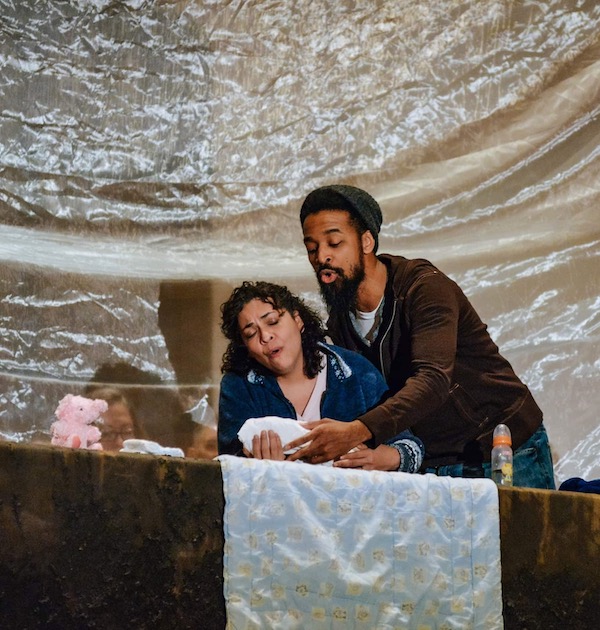IN Series’ “L’enfance” presents a theatrical take on Berlioz’s Christmas oratorio

Hector Berlioz was not a spiritual man. Yet L’enfance du Christ, one of his most substantial works, is wholly religious. The oratorio depicts not only the childhood of Christ, but also Herod’s murder of infants in Judea, which led Mary, Joseph and Jesus to flee to Egypt. Berlioz deemed it as his Trilogie Sacrée (sacred trilogy), comprised of three sections and programmed with an orchestra, a cast of vocalists, a choir, and words Berlioz wrote himself.
The oratorio is typically presented as part of a traditional orchestra or choir concert. IN Series’ production, however, which took place Saturday at the Foundry United Methodist Church in its final performance, is anything but traditional.
As directed by Scott Mazzola and Timothy Nelson, this L’enfance du Christ is a fully immersive experience, with singers moving through the aisles, pews and balcony throughout the performance. It is staged as an exploration of human migration and persecution, telling the oratorio’s story through interactive theater, as well as music.
Ian McEuen as the Narrator sings the prologue at the church’s podium, which towers over the stage and the audience. The orchestra responds with an opening fugue, greeted by two lines of actors entering the sanctuary from the back doors, depicting prisoners. Joseph Kaz (Centurion) and Elliot Matheny (Polydorus) lead the prisoners, later enforcing Herod’s murder sentence by slaughtering their infants, who are represented by the actor’s white cloths.
In the final scene of part I, Elizabeth Mondragon (Mary) and Jarrod Lee (Joseph) sing a beautiful duet over baby Jesus, praying for their safety as they flee the city. They are staged on the church’s balcony in the back of the sanctuary, helping further project their voices throughout the space.
Part II of the performance depicts the refugees’ journey to Egypt, with a chorus of shepherds singing them along their way. The travelers, holding bags, backpacks and looking weary, trudge throughout the sanctuary, with McEuen narrating their journey as he walks through the audience.
The work’s final section, “Arrival in Sais,” is darker in tone at first, quickly shifting to more joyous when the Holy Family and travelers are greeted with hospitality. The choir and orchestra are in a bright, major key as baby Jesus is presented at the front of the stage. The work concludes with an Epilogue, which begins with quiet, hushed tones in the strings, creating a sacred-like feeling in the sanctuary. McEuen and the chorus conclude the narrative, singing deeply and passionately, inviting the audience to stand together in celebration.
The theatrical side of the performance felt a bit distracting, making it difficult to focus on the oratorio’s overall message and the quality of the music. After a couple scenes, however, the immersive theater component began to blend more seamlessly with the music, feeling more like a complement rather than a discord.
The musicians and singers were well-polished, both in technique and in expression. Conducted by Stanley Thurston, the orchestra, playing was consistently warm in tone, well-blended in voice and aligned with the singers. Dynamics and balancing were varied and sensitive as well, helping shape each scene’s emotional tone.
Each singer performed at a similar high artistic level. As the Narrator, McEuen helped set the tone for the beginning, middle and end of the piece. His tenor was rich and operatic, accurate in pitch and sensitive to mood—especially in the epilogue, where he passionately sang of the Holy Family’s safe arrival in Egypt. Baritone Kerry Wilkerson (Herod) was especially jarring, with his deep, seasoned tone and emotive vibrato. The other main characters (including Kaz, Matheny, Mondragon and Lee) were solid musicians in their own right, narrating the oratorio with grace and expression.
IN Series’ staging not only visualized the narrative, but made an emotional connection to the music. Mazzola and Nelson’s retooling, while certainly out of the ordinary, offers a pathway towards deeper connection to and understanding of the oratorio. Audience members are invited to not just watch, but fully experience L’enfance du Christ, hearing and seeing the classic biblical story come to life theatrically as well as musically.
IN Series presents “La Cabaret de Carmen” January 4-19, 2020. inseries.org
